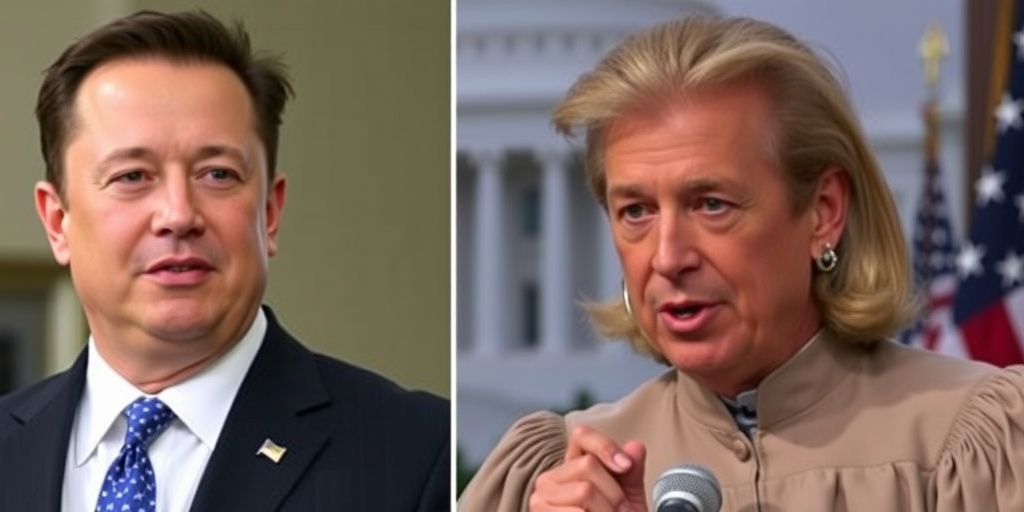Now Reading: Musk and GOP Lawmakers Pressure Judges with Impeachment Threats
-
01
Musk and GOP Lawmakers Pressure Judges with Impeachment Threats
Musk and GOP Lawmakers Pressure Judges with Impeachment Threats

Title: Rising Calls Among Congressional Republicans to Remove Federal Judges Amid Trump Administration’s Legal Challenges
In a striking turn of events, certain factions within the Congressional Republican Party, encouraged by influential figures such as Elon Musk and prominent allies of former President Donald Trump, are intensifying efforts to impeach federal judges who hinder the administration’s attempts at overhauling government operations. This development raises significant concerns regarding the constitutional safeguards that separate the powers of the executive and judicial branches.
The prospect of judicial impeachment essentially highlights a perilous trend towards breaching the foundational tenets of the separation of powers, a critical element of the U.S. government. Currently, such movements, spearheaded primarily by conservative members in the House of Representatives, have not garnered substantial backing from congressional leadership. Legal experts stress that impeaching a federal judge is an exceedingly rare occurrence, often necessitating extensive procedural undertakings that consume considerable time and resources. A two-thirds majority vote in the Senate is required for an impeachment conviction, making any efforts in this regard likely futile.
Despite these challenges, the mere suggestion of impeaching judges signals a breathtaking effort by certain Republicans to exert control over the judiciary, emboldening claims that these moves are aimed at intimidating judges whose rulings may counter the interests of Trump and his administration. Critics argue that this campaign seeks to destabilize judicial independence and coerce judges into making decisions aligned with political agendas.
Elon Musk, who has openly advocated for this movement on his social media platform X (formerly known as Twitter), asserted, “The only way to restore rule of the people in America is to impeach judges.” Musk’s remarks coincide with the Trump administration facing setbacks due to rulings that challenge its authority over executive actions, including high-profile budget cuts and significant workforce reductions. He has drawn troubling comparisons to the judicial purges undertaken by the right-wing government in El Salvador, suggesting that he views such actions as a path toward consolidating control over governmental functions.
Conservative House Republicans have initiated impeachment articles against federal judges, painting them as obstacles to the Trump administration, alleging corrupt motives behind their decisions. Representative Eli Crane from Arizona exemplified this sentiment, criticizing Judge Paul A. Engelmayer, a Barack Obama appointee. Crane’s impeachment filing came in response to Engelmayer’s ruling that temporarily restricted access to Treasury Department records by Trump’s appointed officials, suggesting that the judge should leave if he wishes to engage in political activities.
Historically, judicial impeachments are reserved primarily for severe misconduct rather than judicial decision-making. Only eight federal judges have been impeached, convicted, and removed from office throughout the nation’s history—a number that underscores how infrequent and consequential such actions are. Critics of the impeachment movement claim it constitutes a direct assault on judicial independence, aimed at instilling fear among judges to deter them from making rulings that contradict the political aims of Trump and his allies.
Senator Richard Durbin from Illinois, a leading Democrat on the Judiciary Committee, remarked that the impeachment proposals are explicit efforts to intimidate judges, ensuring they do not rule unfavorably against Trump. Senator Richard Blumenthal echoed these sentiments, arguing that such actions represent raw political maneuvers aimed at undermining the judiciary. The atmosphere of intimidation surrounding judges has escalated significantly, a concern notably acknowledged by Chief Justice John G. Roberts Jr., who condemned attempts to influence judicial rulings.
The American College of Trial Lawyers, a respected legal organization, has publicly denounced the calls for impeachment emanating from Musk and others, stating that threats against judges based on their rulings lack constitutional justification and violate foundational principles of the legal system.
The campaign against judicial rulings is not limited to Musk and fringe House conservatives. Prominent Senate Republicans and even former President Trump have weighed in, with Trump suggesting scrutiny of judges who block his administration’s actions. Senator Mike Lee, a member of the Judiciary Committee, made comments suggesting that judges who issued unfavorable rulings should face impeachment, labeling such rulings as indicative of a “judicial coup.”
While some senior Republican figures call for caution regarding such extreme measures, asserting that impeachment should not be wielded as a tool for political dissatisfaction, others still express support for holding judges accountable for perceived misconduct. Senator Lindsey Graham articulated a belief that an impeachment should not be pursued simply because of disagreement with a judicial decision, emphasizing that judges must engage in unethical behavior to justify removal.
Given the lack of widespread support for these impeachment initiatives and the high threshold required to succeed in the Senate, it seems unlikely that these calls will gain significant momentum. Instead, federal judges and the broader public will be watching closely to see how the Trump administration navigates the rulings that challenge its authority. Ultimately, as Senator Durbin pointed out, the final resolution may lie in the hands of the courts, contingent upon whether Trump adheres to judicial orders that do not align with his administration’s objectives.
Stay Informed With the Latest & Most Important News
Previous Post
Next Post
-
 01New technology breakthrough has everyone talking right now
01New technology breakthrough has everyone talking right now -
 02Unbelievable life hack everyone needs to try today
02Unbelievable life hack everyone needs to try today -
 03Fascinating discovery found buried deep beneath the ocean
03Fascinating discovery found buried deep beneath the ocean -
 04Man invents genius device that solves everyday problems
04Man invents genius device that solves everyday problems -
 05Shocking discovery that changes what we know forever
05Shocking discovery that changes what we know forever -
 06Internet goes wild over celebrity’s unexpected fashion choice
06Internet goes wild over celebrity’s unexpected fashion choice -
 07Rare animal sighting stuns scientists and wildlife lovers
07Rare animal sighting stuns scientists and wildlife lovers





















